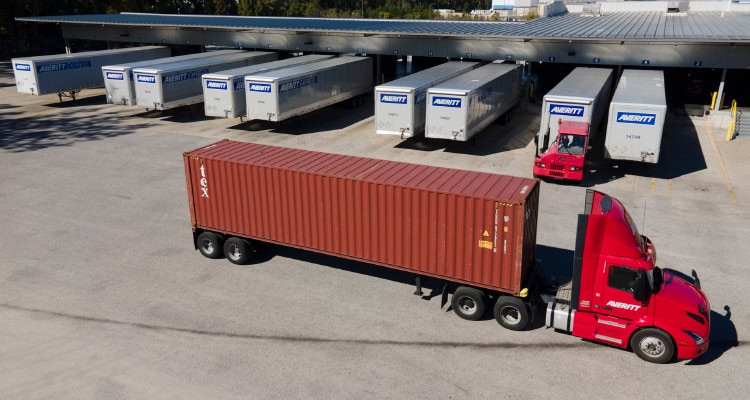Hats Off to Core Carriers!

Want to brim with confidence when selecting a core carrier? When weighing this critical decision, consider a range of complex factors before you tip your cap to any one trucking company.
Choosing core, preferred carriers can be among the most important decisions shippers make for supply chain health and efficiency. For that reason, shippers should select these vital partners with an eye on developing strategic, long-term relationships. That’s where the value lies.
Seeking core carriers who can consistently meet a company’s operational, financial, and service-level requirements is a must, advises Tom Moore, founder and CEO of ProvisionAi, a Tennessee-based optimized network replenishment capacity management and load optimization solution provider. The benefits of using core carriers are clear: service consistency, negotiated rates, streamlined operations, priority treatment, and improved communication.
“There is likely to be a shortage of carriers when the economy heats back up, so having relationships with financially stable carriers is paramount to guaranteeing future capacity,” Moore says. “As volume ramps up, even contracted carriers may choose to jump to the spot market or other contracts that provide better rates.”
What else should be top of mind for shippers going through the selection process? Here are some key considerations for shippers seeking core carriers.
First and foremost, core carriers should have the capabilities to manage shippers’ needs.
“Shippers want to ensure their core carriers are reliable and consistently meet delivery schedules and service levels,” says Brian Cupp, director of operations for IntelliTrans, which provides managed transportation services for shippers in the oil/gas, agriculture, mining, forestry, and other industries.
“Shippers also want to consider whether the carrier will cover the geographic regions they ship to and whether the carrier can handle their shipping volume,” he adds. “If the shipper moves special freight such as breakbulk, liquids, or hazardous materials, the core carriers must also have experience and expertise in these areas.”
Counting on Capacity

Reliability and capacity are two of the most important elements shippers look for in a core carrier. Being able to handle regular pickups and deliveries without delay is crucial.
Reliability and capacity are especially important for shippers with frequent shipments.
“Carriers must demonstrate the ability to handle regular pickups and deliveries without delays,” Cupp explains, adding that they must also have a strong network in their customers’ desired regions to guarantee timely deliveries. “For shippers with global operations, selecting carriers with solid international networks, customs expertise, and capabilities in handling cross-border logistics is essential.”
Service levels are also crucial. “Carriers must reliably provide the right trucking service if the shipper needs LTL or full truckload shipments,” he adds.
Shippers should also ensure that carriers have flexibility around volume. “Nothing in transportation volumes is ever consistent,” notes Martin Burnham, president of Hercules Freight, an asset-based motor carrier with 26 locations in Canada and the United States.
In today’s supply chain, speed and predictability are pivotal.
“Carriers that allow for direct shipments without stopping at multiple breakbulk terminals on the way to a destination result in faster, more consistent transit times, while minimizing opportunities for delays and product damage,” Burnham says.
If shippers don’t understand the capabilities that they need, problems can arise. Shippers should be clear and accurate about their requirements, including frequency, geographic coverage, and service needs.
“Some shippers don’t give this the attention it deserves and they’re wildly wrong with the requirements they communicate to carriers,” says Andy Dyer, CEO of AFS Logistics, a third-party logistics provider based in Shreveport, Louisiana. “Some shippers inflate their volumes to get a better deal, but their actual freight volume is much lower.
“Shippers need to be honest, whether it’s about total volumes or seasonality,” Dyer adds. “Everyone will see the truth when the freight actually hits.”
Shippers should also prioritize the value that carriers provide, including on-time deliveries and the care that carriers take with goods. For that reason, shippers should seek carriers with a low claims ratio and a strong record for limiting delays.
“What good is getting the cheapest rate if you make a sale to a customer, ship the order, and the product arrives late with 10% of it damaged beyond use and it never makes it to the showroom floor?” asks Kent Williams, executive vice president of sales and marketing for Averitt, a freight transportation and supply chain service provider.
Shippers also shouldn’t overlook the intricacies of a carrier’s technological capabilities.
“Real-time tracking empowers shippers to proactively address shipment issues, which helps reduce costs, improve customer satisfaction, and gain a competitive edge,” Cupp says. “By leveraging analytics, shippers can identify carriers with exceptional performance and cost efficiency.
“Furthermore, a carrier’s ability to integrate with systems and adhere to security standards is crucial for seamless operations and risk mitigation,” he adds. “Ultimately, a carrier’s technological capabilities directly impact its ability to deliver exceptional customer experiences and optimize supply chain operations.”
The Role of Costs

When the economy recovers, a shortage of carriers is possible. To offset that issue, shippers can develop relationships with financially stable carriers now to help guarantee future capacity.
Experts agree that costs should not be the primary consideration ahead of factors such as service level, reliability, and reputation. However, its role remains critical—and total costs are not always straightforward.
“Often, shippers establish long-term contracts with carriers to ensure coverage at a specific cost,” Cupp says. “Long-term contracts can provide cost stability and potential discounts, making forecasting and managing transportation budgets easier.”
During contract negotiations, shippers should negotiate surcharges and accessorial charges upfront. “Sometimes, paying a higher rate for a more reliable carrier can save costs in the long run by reducing delays, damages, and lost sales,” he adds.
Too often, shippers believe that a discount is the most important factor in choosing a carrier.
“That approach continues to plague our industry,” Burnham says. “Some informed shippers look at the net costs and factor in surcharges and accessorial fees, but even they are missing the mark.
“To get a true understanding of costs, you must include your entire team and anyone related to the shipment,” he says.
Modeling surcharges “is fundamental to understanding total cost,” Dyer says.
“There are some particular differences from carrier to carrier, but they generally all follow the same rules,” he explains. “In LTL, shippers pay for their share of the capacity inside the truck and it’s a matter of understanding capacity rules. If they know their business, they know what to look at.
“Identify the characteristics that are important to you,” Dyer suggests. “When you do a carrier bid, you might occasionally find a carrier that doesn’t fully disclose surcharges but, for the most part, carriers tend to be honest.”
Finding a Cultural Fit
Shippers sometimes make the mistake of ignoring culture fit when considering carriers. “Overlooking alignment in values and working styles can lead to friction and reduced collaboration,” Moore says.
Shippers need to know how carriers solve problems when they arise and whether they have a proven track record for doing so. “Contact client references like you would when vetting a potential employee,” Burnham recommends.
Carrier contracts should also include a clear dispute-resolution process for handling conflicts. They should also allow for regular audits and reviews of service performance and cost structures, and clearly define the conditions under which either party can terminate the contract.
“Failure to thoroughly vet carriers for their financial stability, service capabilities, and track record can lead to choosing an unreliable partner,” Cupp says.
Visiting a carrier’s operation to make sure the facilities match the marketing brochure and to see firsthand how the warehouse handles shipments is a wise decision.
Carriers should offer financial stability and serviceability, too. Check carrier financials using public information and services such as Dun & Bradstreet and Carrier411. “The first sign that a company is in financial distress is if they stop paying on time,” Dyer explains.
When evaluating service, be wary of fraud, particularly ensuring that carriers “are who they say they are,” he adds.
“Knowing your provider is crucial,” Dyer says. “It’s not about relationships—whether you like them or not. This is about whether you’re dealing with an actual known party.”
Commit to Collaboration

Averitt works to win core carrier business by prioritizing on-time deliveries and customer service while offering technology enhancements such as real-time tracking and data analytics.
Securing a long-term strategic partnership is also an important goal when evaluating core carriers. Shippers should emphasize this over focusing simply on transactional partnerships.
For instance, Averitt’s most productive customer relationships are based on years or even decades of collaboration. “That way we really understand their business,” Williams says.
In those types of relationships, carriers can provide invaluable strategic insights, including the design of a shipper’s supply chain network.
“Shippers want a collaborative approach, and want to find a carrier who will also welcome such an approach,” Williams says. “They are looking for mutually beneficial relationships, which means there’s often some give and take.”
When this symbiotic relationship is not there, shippers end up frequently going to market to switch carriers and start relationships over, struggling to build continuity and long-term value.
The importance of both shipper and carrier teams working together cannot be overstated.
“Whether it’s a driver working with a shipper on a warehouse floor, or the traffic director working with the carrier sales representative, it’s a team game that can only be won when everyone works together,” Burnham says.
“Shippers who ask their carriers, ‘How are we doing as a shipper? What can we do to help you do your job?’ can explore ways to strengthen the work being done together that benefits both parties and avoids future issues,” he adds.
In short, successful long-term relationships between shippers and carriers depend on both sides getting something positive out of the experience.
“Everyone has to win,” Dyer says. “You can’t approach carrier relationships as a zero-sum game, or you’ll lose out.”
“How you treat your carriers is the determining factor in how well your relationships work,” he adds. “Some shippers might drop a carrier in a nanosecond to save a few cents, or because some other carrier offers an incentive to switch. Over time, shippers who treat their carriers poorly develop a bad reputation. That’s something shippers want to avoid.”
How to Become a Shipper of Choice
Companies see clear benefits if they are considered a shipper of choice.
“In today’s competitive shipping landscape, carriers wield significant power in selecting their business partners,” explains Brian Cupp, director of operations for IntelliTrans. “To become a shipper of choice, businesses must prioritize strong carrier relationships, operational efficiency, and exceptional communication.”
Companies striving to be considered shippers of choice should aim to build mutually beneficial relationships based on consistent volume and predictability, efficient operations, fair and transparent communication, prompt payment, flexibility and collaboration, and respect and professionalism, recommends Tom Moore, founder and CEO of ProvisionAi.
Other keys to being a shipper of choice include maintaining open dialogue, honoring payment terms, and holding regular business reviews, says Martin Burnham, president of Hercules. He also cites keeping drivers and equipment moving—“static drivers or equipment is dead cost to a carrier,” he says—and having freight ready for pickup to limit driver dwell time and trucks being ordered and not used.
In that vein, shippers should be able to provide an accurate picture of their network operating requirements to communicate with carriers and make commitments that they can realistically uphold.
“For instance, a shipper has to be able to accurately describe what it’s like for a driver getting on and off property, and for a shipper with multiple facilities, that might vary from one site to another,” says Andy Dyer, CEO of AFS Logistics.
“For the facilities in question, how does ingress and egress work? What is loading like? Are appointments required and, if so, how easy is it to set and change appointments?” he says.
“If a shipper doesn’t have a complete understanding of all these factors, they might think something is a lot easier than it really is and find they don’t have the sustained stream of capacity to the price committed,” Dyer notes.
